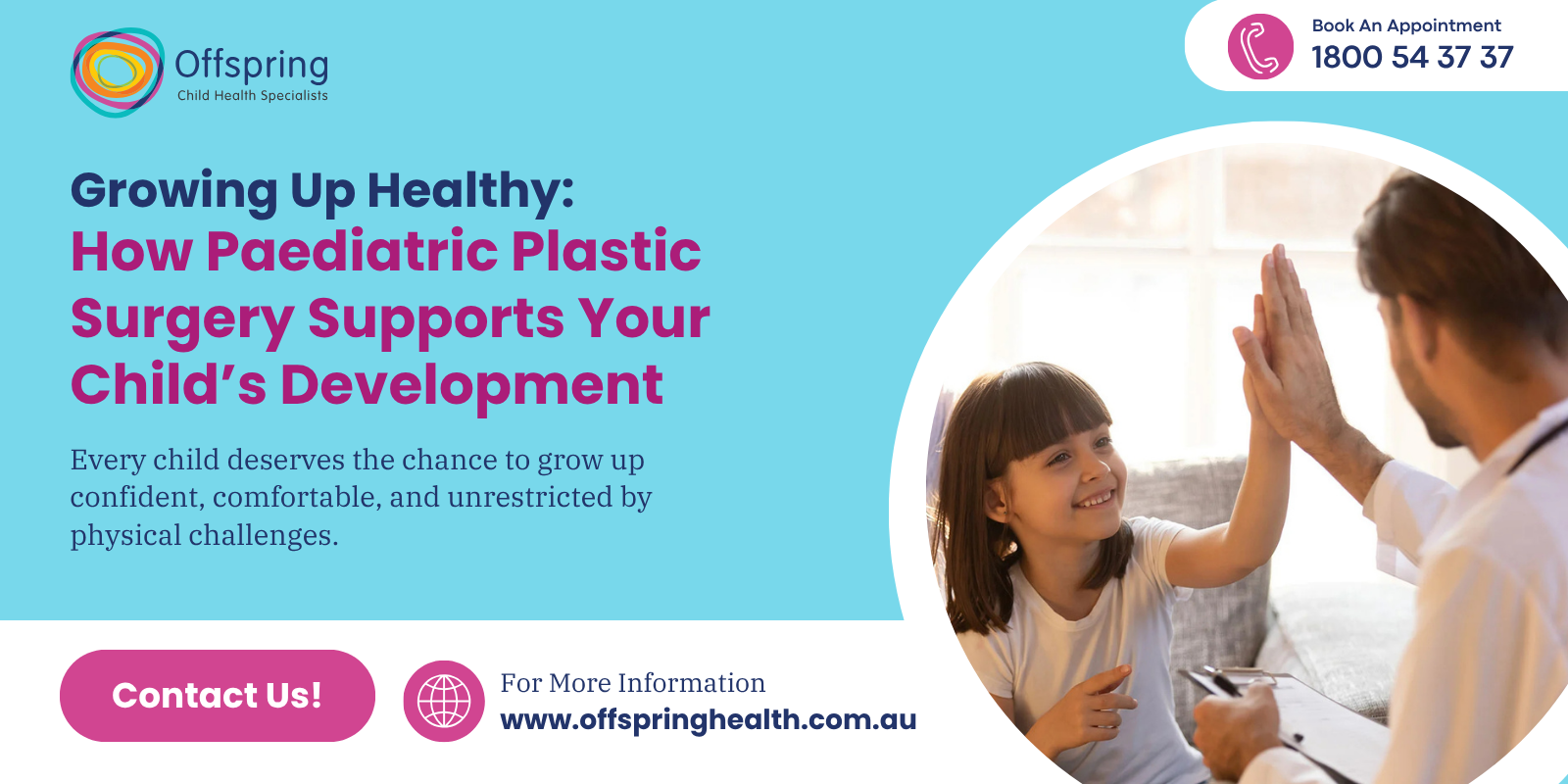Growing Up Healthy How Paediatric Plastic Surgery Supports Your Child’s Development
Every child deserves the chance to grow up confident, comfortable, and unrestricted by physical challenges. At Offspring Health, we specialise in Paediatric plastic surgery that helps children thrive—whether they need a functional fix, cosmetic improvement, or long-term support after an injury.
From trigger thumbs to otoplasty, congenital birthmarks, burns, and scarring, here’s how our experienced team can help.
Trigger Thumb: When a Small Thumb Needs Big Attention
Trigger thumb is a condition seen in babies and toddlers where the thumb becomes stuck in a bent position or clicks during movement. This happens when a tendon in the thumb can’t move smoothly, often because of tightness or inflammation.
How We Treat It
- Watch and Wait: Many children improve on their own, especially those diagnosed before 1 year of age.
- Splinting and Exercises: Stretching and night-time splinting can resolve the condition over time.
- Surgery: A short outpatient procedure can permanently fix a locked or unresponsive thumb, restoring full movement.
Otoplasty: Reshaping Ears, Restoring Confidence
Children with prominent or misshapen ears may face teasing or self-consciousness, especially in school. Otoplasty, or ear reshaping surgery, offers a permanent, natural-looking solution—usually around ages 4 to 6, when ear cartilage is more stable.
What to Expect
- A day surgery under general anaesthesia.
- Hidden scars behind the ears.
- Quick recovery, with most kids back to normal in two weeks.
Management of Congenital Moles and Birthmarks
Many children are born with birthmarks or develop moles shortly after birth. While often harmless, some lesions need monitoring or treatment—especially if they change in size or appearance, or if they’re located in a sensitive area.
Types We Commonly See
- Melanocytic naevi (moles)
- Haemangiomas (vascular birthmarks)
Treatment Options
- Observation: Many birthmarks require no treatment and some may fade over time.
- Laser: Useful for helping camouflage lesions, especially vascular malformations.
- Surgical Removal: Used when moles pose a cancer risk, cause functional problems (like vision obstruction), or are in visible areas.
- Complex Reconstruction: For larger or deeper lesions, advanced techniques like serial excisions or tissue expansion may be used.
We carefully evaluate each case to balance aesthetics, safety, and your child’s comfort.
Scar Management in Children: Healing Beyond the Wound
Scars are part of healing, but they can affect appearance and movement—especially for active, growing kids. Some children develop hypertrophic or keloid scars, which are raised and more difficult to manage.
Treatment Strategies
At-Home Basics:
- Sun protection – to prevent permanent discoloration.
- Moisturiser and Massage – to soften and realign collagen in the scar.
Non-Surgical Options:
- Silicone sheets or gels – reduce thickness and redness.
- Pressure garments – especially helpful for burn scars.
- Steroid injections – for keloids or prominent scars.
Surgical Revision:
When scars affect function or self-esteem, surgical removal or rearrangement may be needed. Techniques like scar revision, tissue expansion, or flaps (skin-rearrangement) are tailored to each child’s needs.
Treating Burns: From Emergency Care to Recovery
Burns in children are unfortunately common—often caused by hot water, food, or heated surfaces. Prompt, proper care can reduce complications and long-term scarring.
First Aid Steps
- Cool the burn with running water for 20 minutes (within the first 4 hours). In small children with large burns, care must be taken to ensure the child does not get cold.
- Avoid ice or home remedies (like butter or toothpaste).
- Cover lightly with cling film and seek emergency care for large or blistering burns.
Understanding Burn Severity
- Epidermal (surface) burns: Red, painful, no blisters—usually heal without intervention.
- Dermal (deeper) burns: Often blistered, need dressing or sometimes surgery.
- Full thickness burns: Affect all skin layers—require surgical treatment and long-term care.
Ongoing Burn Care
Burns may be treated with:
- Silver-based dressings to prevent infection.
- Skin grafts for deeper wounds.
- Scar therapy post-healing, including silicone dressings, pressure garments, or splints.
For smaller burns or scar follow-up, Offspring Health offers tailored treatments to help kids regain function and confidence after a burn injury.
Why Choose Offspring Health?
At Offspring Health, we don’t just treat conditions—we care for children and families. Our Paediatric plastic surgery team is specially trained to work with kids of all ages, offering compassionate, expert care tailored to each child’s needs and developmental stage.
Whether you’re navigating a new diagnosis or seeking long-term scar management, we’re here to help your child heal beautifully and confidently.

